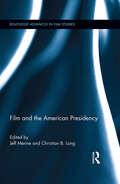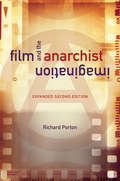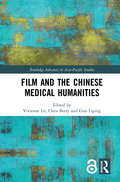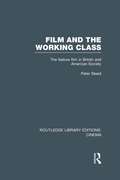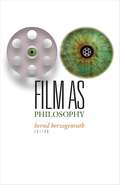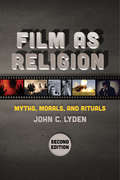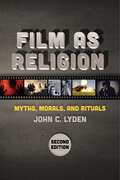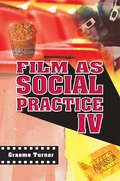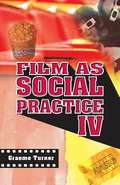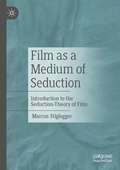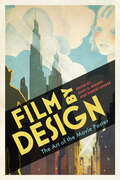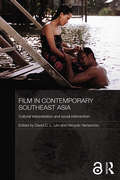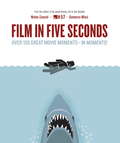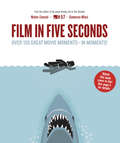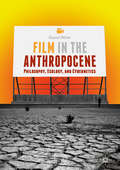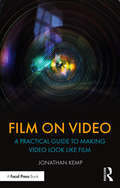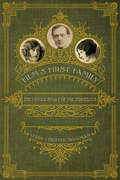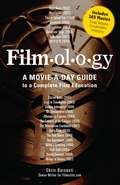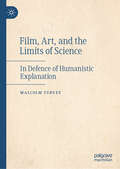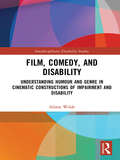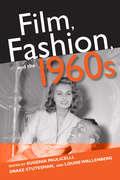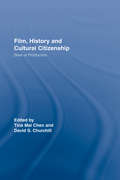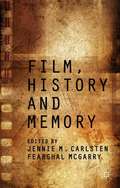- Table View
- List View
Film and the American Presidency (Routledge Advances in Film Studies)
by Jeff Menne Christian B. LongThe contention of Film and the American Presidency is that over the twentieth century the cinema has been a silent partner in setting the parameters of what we might call the presidential imaginary. This volume surveys the partnership in its longevity, placing stress on especially iconic presidents such as Lincoln and FDR. The contributions to this collection probe the rich interactions between these high institutions of culture and politics—Hollywood and the presidency—and argue that not only did Hollywood acting become an idiom for presidential style, but that Hollywood early on understood its own identity through the presidency’s peculiar mix of national epic and unified protagonist. Additionally, they contend that studios often made their films to sway political outcomes; that the performance of presidential personae has been constrained by the kinds of bodies (for so long, white and male) that have occupied the office, such that presidential embodiment obscures the body politic; and that Hollywood and the presidency may finally be nothing more than two privileged figures of media-age power.
Film and the Anarchist Imagination: Expanded Second Edition
by Richard PortonHailed since its initial release, Film and the Anarchist Imagination offers the authoritative account of films featuring anarchist characters and motifs. Richard Porton delves into the many ways filmmakers have portrayed anarchism’s long traditions of labor agitation and revolutionary struggle. While acknowledging cinema’s predilection for ludicrous anarchist stereotypes, he focuses on films that, wittingly or otherwise, reflect or even promote workplace resistance, anarchist pedagogy, self-emancipation, and anti-statist insurrection. Porton ranges from the silent era to the classics Zéro de Conduite and Love and Anarchy to contemporary films like The Nothing Factory while engaging the works of Jean Vigo, Jean-Luc Godard, Lina Wertmüller, Yvonne Rainer, Ken Loach, and others. For this updated second edition, Porton reflects on several new topics, including the negative portrayals of anarchism over the past twenty years and the contemporary embrace of post-anarchism.
Film and the Chinese Medical Humanities (Routledge Advances in Asia-Pacific Studies)
by Chris Berry Vivienne Lo Guo LipingFilm and the Chinese Medical Humanities is the first book to reflect on the power of film in representing medical and health discourse in China in both the past and the present, as well as in shaping its future. Drawing on both feature and documentary films from mainland China, the chapters each engage with the field of medicine through the visual arts. They cover themes such as the history of doctors and their concepts of disease and therapies, understanding the patient experience of illness and death, and establishing empathy and compassion in medical practice, as well as the HIV/AIDs epidemic during the 1980s and 90s and changing attitudes towards disability. Inherently interdisciplinary in nature, the contributors therefore provide different perspectives from the fields of history, psychiatry, film studies, anthropology, linguistics, public health and occupational therapy, as they relate to China and people who identify as Chinese. Their combined approaches are united by a passion for improving the cross-cultural understanding of the body and ultimately healthcare itself. A key resource for educators in the Medical Humanities, this book will be useful to students and scholars of Chinese Studies and Film Studies as well as global health, medical anthropology and medical history.
Film and the Natural Environment: Elements and Atmospheres (Short Cuts)
by Adam O'BrienEnvironmental themes are present in cinema more than ever before. But the relationship between film and the natural world is a long and complex one, not reducible to issues such as climate change and pollution. This volume demonstrates how an awareness of natural features and dynamics can enhance our understanding of three key film-studies topics – narrative, genre, and national cinema. It does so by drawing on examples from a broad historical and geographical spectrum, including Sunrise, A River Called Titas, and Profound Desires of the Gods. The first introductory text on a topic which has long been overlooked in the discipline, Film and the Natural Environment argues that the nonhuman world can be understood not just as a theme but as a creative resource available to all filmmakers. It invites readers to consider some of the particular strengths and weaknesses of cinema as communicator of environmental phenomena, and collates ideas and passages from a range of critics and theorists who have contributed to our understanding of moving images and the natural world.
Film and the Working Class: The Feature Film in British and American Society (Routledge Library Editions: Cinema)
by Peter SteadTaking the subject chronologically from the 1890s to when the book was initially published in 1989, this book analyses those films specifically concerned with working-class conditions and struggle, and discusses them within the context of the debate on the social significance of the feature film. It concentrates on films which depict labour organizations and political activists, as well as life in working-class communities and actors with working-class identities such as James Cagney. Reviews of the original edition: ‘…fills a gap in film studies…the study of social and labour history, and the development of popular culture in Britain and the United States.’
Film as Philosophy
by Bernd HerzogenrathFilm and philosophy have much in common, and books have been written on film and philosophy. But can films be, or do, philosophy? Can they &“think&”? Film as Philosophy is the first book to explore this fascinating question historically, thematically, and methodically.Bringing together leading scholars from universities across the globe, Film as Philosophy presents major new research that leads film studies and philosophy into a productive dialogue. It provides a uniquely sweeping, historical overview of the confluence of film and philosophy for more than a century, considering films from Jean Renoir, Lars von Trier, Jørgen Leth, David Lynch, Michael Haneke, and others; the written works of filmmakers who also theorized on the medium, including Sergei Eisenstein and Jean Epstein; and others who have written on cinema, including Hugo Münsterberg, Béla Balázs, André Bazin, Henri Bergson, Gilles Deleuze, Stanley Cavell, Alain Badiou, Jacques Rancière, and many more. Representing a major step toward establishing a media philosophy that puts the status, role, and function of film into a new perspective, Film as Philosophy removes representational techniques from the center of inquiry, replacing these with the medium&’s ability to &“think.&” Hence it accords film with &“agency,&” and the dialogue between it and philosophy (and even neuroscience) is negotiated anew.Contributors: Nicole Brenez, U of Paris 3–Sorbonne; Elisabeth Bronfen, U of Zurich; Noël Carroll, CUNY; Tom Conley, Harvard U; Angela Dalle Vacche, Georgia Institute of Technology; Gregory Flaxman, U of North Carolina, Chapel Hill; Alex Ling, Western Sydney U; Adrian Martin, Monash U; John Ó Maoilearca, Kingston U, London; Robert Sinnerbrink, Macquarie U, Sydney; Murray Smith, U of Kent, Canterbury; Julia Vassilieva, Monash U, Melbourne; Christophe Wall-Romana, U of Minnesota; and Thomas E. Wartenberg, Mount Holyoke College.
Film as Religion, Second Edition: Myths, Morals, and Rituals
by John C. LydenArgues that popular films perform a religious function in our culture The first edition of Film as Religion was one of the first texts to develop a framework for the analysis of the religious function of films for audiences. Like more formal religious institutions, films can provide us with ways to view the world and the values to confront it. Lyden argues that the cultural influence of films is analogous to that of religions, so that films can be understood as representing a “religious” worldview in their own right. Thoroughly updating his examples, Lyden examines a range of film genres and individual films, from The Godfather to The Hunger Games to Frozen, to show how film can function religiously.
Film as Religion, Second Edition: Myths, Morals, and Rituals
by John C. LydenArgues that popular films perform a religious function in our culture The first edition of Film as Religion was one of the first texts to develop a framework for the analysis of the religious function of films for audiences. Like more formal religious institutions, films can provide us with ways to view the world and the values to confront it. Lyden argues that the cultural influence of films is analogous to that of religions, so that films can be understood as representing a “religious” worldview in their own right. Thoroughly updating his examples, Lyden examines a range of film genres and individual films, from The Godfather to The Hunger Games to Frozen, to show how film can function religiously.
Film as Social Practice
by Graeme TurnerThis fourth edition of our bestselling text has been comprehensively updated and revised to include contemporary film analysis and recent films. With a focus on contemporary popular cinema and examples from Classical Hollywood, Graeme Turner examines the social and cultural aspects of film from audiences and ideologies to exhibition and technology. This fourth edition now includes: new sections dealing with debates about spectacle and special effects an extended treatment of sound and its contribution to cinema film theory’s discussion of the representation of race and ethnicity a thorough update of individual film references a revised applications chapter that includes new contemporary examples new illustrations from contemporary popular cinema. Students of film studies, film practice and film theory will find this a welcome addition to their degree course studies.
Film as Social Practice (4th Edition)
by Graeme TurnerThis fourth edition of our bestselling classic text has been comprehensively updated and revised to include contemporary film analysis and recent films. With a focus on contemporary popular cinema and examples from Classical Hollywood, Graeme Turner examines the social and cultural aspects of film from audiences and ideologies to exhibition and technology. This fourth edition now includes: new sections dealing with debates about spectacle and special effects an extended treatment of sound and its contribution to cinema film theory's discussion of the representation of race and ethnicity a thorough update of individual film references a revised applications chapter that includes new contemporary examples new illustrations from contemporary popular cinema. Students of film studies, film practice and film theory will find this a welcome addition to their degree course studies.
Film as a Medium of Seduction: Introduction to the Seduction-Theory of Film
by Marcus StigleggerThe seduction-theory defines film in a broader sense as a medium of seduction, based on the French concept of séduction. It is a theoretical approach influenced by continental philosophy and classical film theory, linked to a three-stage analytical model. The book introduces the theoretical foundations and, using various classical and contemporary examples from film history, presents a genuine method of film analysis.
Film by Design: The Art of the Movie Poster
by Gary D. Rhodes and Robert SingerContributions by Vlad Dima, Laura Hatry, Alicia Kozma, Lynette Kuliyeva, Madhuja Mukherjee, Frank Percaccio, Gary D. Rhodes, Courtney Ruffner Grieneisen, Marlisa Santos, Michael L. Shuman, and Robert Singer Movie posters, regardless of their country of origin, have become indelibly linked with the films they represent, often assuming a status as visual encapsulations of films within collective memory. Long after their initial role in promotion is complete, these posters endure as iconic images, etched into film history and cultural consciousness. One can hardly hear mention of Steven Spielberg’s landmark production Jaws, for example, without immediately picturing the evocative poster art of Roger Kastel.Film by Design: The Art of the Movie Poster is a groundbreaking and comprehensive exploration of the international and Hollywood movie poster as a dynamic artistic and cultural formation. Drawing inspiration from such prominent genres as horror, science fiction, and noir, the twelve essays in this collection provide insightful analyses of the movie poster as a vital component of the cinematic landscape from the silent era to the contemporary period. Crucially, this anthology rejects the notion of movie posters as mere historical artifacts or advertising tools and instead examines them as integral parts of a broader aesthetic framework interwoven into their respective film narratives. Each chapter, whether focusing on controversies, close-ups, or Cuba, is accessible to scholars, students, and fans alike. Through its intervention in film studies, Film by Design reveals the movie poster to be an ever-evolving medium, firmly grounded in both theory and practice, while serving as an essential and enduring element within the realm of film art.
Film in Contemporary Southeast Asia: Cultural Interpretation and Social Intervention (Media, Culture and Social Change in Asia)
by David C. L. Lim Hiroyuki YamamotoThis book discusses contemporary film in all the main countries of Southeast Asia, and the social practices and ideologies which films either represent or oppose. It shows how film acquires signification through cultural interpretation, and how film also serves as a site of contestations between social and political agents seeking to promote, challenge, or erase certain meanings, messages or ideas from public circulation. A unique feature of the book is that it focuses as much on films as it does on the societies from which these films emerge: it considers the reasons for film-makers taking the positions they take; the positions and counter-positions taken; the response of different communities; and the extent to which these interventions are connected to global flows of culture and capital. The wide range of subjects covered include documentaries as political interventions in Singapore; political film-makers’ collectives in the Philippines, and films about prostitution in Cambodia and patriotism in Malaysia, and the Chinese in Indonesia. The book analyses films from Burma, Laos, Cambodia, Vietnam, Thailand, Malaysia, Singapore, Indonesia and the Philippines, across a broad range of productions – such as mainstream and independent features across genres (for example comedy, patriotic, political, historical genres) alongside documentary, classic and diasporic films.
Film in Five Seconds
by H-57 Gianmarco Milesi Matteo CivaschiIn today's jet-fuelled, caffeine-charged, celebrity-a-minute world, who actually has the time to watch a film from start to finish? Let's face it, life's too short. Now, Film in Five Seconds lets you fast-forward to the best bits so you can enjoy all your favourite movie moments in - literally - moments. Design studio H-57 have taken over 150 iconic films and cut away all the useless details, boiling them down into ingenious pictograms and creating hilarious visual snapshots that are witty, provocative and to the point. From Batman to Bridget Jones, Grease to The Godfather, King Kong to The King's Speech, via slapstick, sci-fi and superheroes, you'll laugh out loud as you identify some of the greatest screen moments of all time. This is the perfect book for film buffs and anyone with a sense of humour or a short attention span.
Film in Five Seconds
by Gianmarco Milesi Matteo CivaschiIn today's jet-fuelled, caffeine-charged, celebrity-a-minute world, who actually has the time to watch a film from start to finish? Let's face it, life's too short. Now, Film in Five Seconds lets you fast-forward to the best bits so you can enjoy all your favourite movie moments in - literally - moments. Design studio H-57 have taken over 150 iconic films and cut away all the useless details, boiling them down into ingenious pictograms and creating hilarious visual snapshots that are witty, provocative and to the point. From Batman to Bridget Jones, Grease to The Godfather, King Kong to The King's Speech, via slapstick, sci-fi and superheroes, you'll laugh out loud as you identify some of the greatest screen moments of all time. This is the perfect book for film buffs and anyone with a sense of humour or a short attention span.
Film in Five Seconds: Over 150 Great Movie Moments - In Moments!
by H-57In today's jet-fueled, caffeine-charged, celebrity-a-minute world, who actually has the time to watch a film from start to finish? Let's face it, life's too short. Now, Film in Five Seconds lets you fast-forward to the best bits so you can enjoy all your favorite movie moments in--literally--moments.Design studio H-57 have taken over 150 iconic films and cut away all the useless details, boiling them down into ingenious pictograms and creating hilarious visual snapshots that are witty, provocative and to the point.From Batman to Bridget Jones, Grease to The Godfather, King Kong to The King's Speech, via slapstick, sci-fi and superheroes, you'll laugh out loud as you identify some of the greatest screen moments of all time. This is the perfect book for film buffs and anyone with a sense of humor or a short attention span.
Film in the Anthropocene: Philosophy, Ecology, and Cybernetics
by Daniel WhiteThis book provides an interdisciplinary analysis of film in the context of the Anthropocene: the new geological era in which human beings have collectively become a force of nature. Daniel White draws on perspectives in philosophy, ecology, and cybernetics (the science of communication and control in animals and machines) to explore human self-understanding through film in the new era. The classical figure of Janus, looking both to the future and the past, serves as a guide throughout the study. Both feature and documentary films are considered.
Film on Video: A Practical Guide to Making Video Look like Film
by Jonathan KempFilm on Video: A Practical Guide to Making Video Look like Film is an accessible guide to making video captured on a camcorder, DSLR camera, smartphone, action camera or cinema camera look like it was shot on motion-picture celluloid film. Chapter by chapter, Jonathan Kemp introduces the reader to a key characteristic of celluloid film, explains the historical and practical reasons why it exists, before providing a simplified method for best replicating that characteristic on a digital camera. The book includes various practical exercises throughout that are designed to underline the takeaway principles of each chapter and features case studies on specific cameras including the Sony NX5 Camcorder, Canon 5D Mk IV, Canon 4000D, iPhone X, GoPro Hero 6, Blackmagic URSA Mini Pro 4.6K and Canon C200. Ideal for students studying film and media production and filmmaking newcomers who want to get up to speed quickly, this is an indispensable guide to how the numerous settings on a digital camera can be used to create footage that more closely resembles the film ‘look’.
Film's First Family: The Untold Story of the Costellos (Screen Classics)
by Terry Chester ShulmanScandal, adultery, secret marriages, celebrity, divorce, custody battles, suicide attempts, and alcoholism -- the trials and tribulations of the Costellos were as riveting as any Hollywood feature film. Written with unprecedented access to the family's personal documents and artifacts -- and interviews with several family members, including Dolores Barrymore Bedell (the daughter of John Barrymore and Dolores Costello) and Helene's daughter Deirdre -- this riveting study explores the dramatic history of the Costellos and their extraordinary significance to the stage and screen.This eccentric, tragic, yet talented clan was one of the twentieth century's most accomplished families of actors -- second only to the Barrymores, with whom they intermarried and begat a film dynasty riddled with jealousy, resentment, and heartbreak. Inevitably, the Costellos' brilliant achievements would be eclipsed by their own immutable penchant for self-destruction. Patriarch Maurice "Dimples" Costello (1877--1950) was considered the first screen idol and the first great movie star until his screen career, marked by accusations of spousal abuse, drunkenness, and physical assault, abruptly ended. His daughter Dolores married John Barrymore, arguably the most famous man in Hollywood during the late 1920s and early '30s, and their son would carry on the Barrymore name to successive generations of famous actors. Costello's other daughter, Helene, was the first actress to star in an all-talking picture, The Lights of New York (1928). However, her career was wracked by scandal in 1932 during her very public divorce from actor-director Lowell Sherman, who testified that his wife was a drunk and an avid reader of pornography. The original members of this pioneering family may be gone, but the name and legacy of the Costellos will live on through their accomplishments, films, and descendants -- most notably, actress Drew Barrymore.
Film*ol*o*gy
by Chris BarsantiSure, you love the movies. But how much do you really know about the ones that really made a difference? Whether it's Birth of a Nation, the brilliant silent film that fanned the flames of racism; Easy Rider, the clarion call for a generation; or Inglourious Basterds, Tarantino's bloody take on art as propaganda, Filmology gives you the most entertaining crash course in good film ever produced-one movie a day. This is not just another greatest-movies celebration. Pairing cinema's lesser-seen gems alongside blockbusters, great early works from the pioneers of film alongside often-overlooked films from great directors, noted film critic Chris Barsanti unveils the movies that you must see-for your viewing pleasure. Filmology: So you can watch your way to an education in film!
Film, Art, and the Limits of Science: In Defence of Humanistic Explanation
by Malcolm TurveyThere is currently a vigorous debate in film studies and related disciplines about the extent to which scientific paradigms like evolutionary psychology and neuroscience can explain the cinema and other artforms. This debate tends to devolve into extreme positions, with many film scholars and other humanists insisting that science has little or no role to play in the study of the arts, while a minority contends that it is always needed to fully account for cultural phenomena like film. Malcolm Turvey advocates for a more moderate position. He argues that, while the sciences can explain much about film and the other arts, there is much about these phenomena that only humanistic methods can account for. He thereby mounts a trenchant defence of the purpose and value of humanistic explanation, one that nevertheless acknowledges and welcomes the legitimate contribution of the sciences to the study of the arts.
Film, Comedy, And Disability: Understanding Humour And Genre In Cinematic Constructions Of Impairment And Disability (Interdisciplinary Disability Studies)
by Alison WildeThis book has been written in an effort to discern some of the limits to representation for portrayals of disability in media, focussing on what is attributable to cinema as a specific medium.1 I will show that there is much understanding to be gained from a synthesis of Disability Studies
Film, Fashion, and the 1960s
by Drake Stutesman Eugenia Paulicelli Louise WallenbergA fascinating look at one of the most experimental, volatile, and influential decades, Film, Fashion, and the 1960s, examines the numerous ways in which film and fashion intersected and affected identity expression during the era. From A Hard Day’s Night to Breakfast at Tiffany’s, from the works of Ingmar Bergman to Blake Edwards, the groundbreaking cinema of the 1960s often used fashion as the ultimate expression for urbanity, youth, and political (un)awareness. Crumbling hierarchies brought together previously separate cultural domains, and these blurred boundaries could be seen in unisex fashions and roles played out on the silver screen. As this volume amply demonstrates, fashion in films from Italy, France, England, Sweden, India, and the United States helped portray the rapidly changing faces of this cultural avant-gardism. This blending of fashion and film ultimately created a new aesthetic that continues to influence the fashion and media of today.
Film, History and Cultural Citizenship: Sites of Production (Routledge Studies in Cultural History)
by Tina Mai Chen; David S. ChurchillThis new book investigates the relationship of film to history, power, memory, and cultural citizenship. The book is concerned with two central issues: firstly, the participation of film and filmmakers in articulating and challenging projects of modernity; and, secondly, the role of film in shaping particular understandings of self and other to evoke collective notions of belonging. These issues call for interdisciplinary and multi-layered analyses that are ideally met through dialogue across place, time, identities and genres. The contributors to this volume enable this dialogue by considering the ways in which cultural expression and identity expressed through film serve to create notions of belonging, group identity, and entitlement within modern societies.
Film, History and Memory
by Fearghal Mcgarry Jennie M. CarlstenFilm, History and Memory examines the relationship between film and history, exploring the multiplicity of ways in which films depict, contest, reinforce or subvert historical understanding. This volume broadens the focus from 'history', the study of past events, to 'memory', the processes – individual, generational, collective or state-driven – by which meanings are attached to the past. This approach acknowledges how the significance of the historical film lies less in its empirical qualities than in its powerful capacity to influence public thinking and discourses about the past, whether by shaping collective memory, popular history and social memory, or by retrieving suppressed or marginalized histories. This study aims to contribute to the growing literature on history and film through the breadth of its approach, both in disciplinary and geographical terms. Contributors are drawn not only from the discipline of history but also film studies, film practice, art history, languages and literature, and cultural studies.
